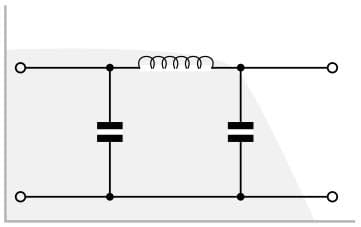Constant-K LC Low Pass Filter Circuit Design & Calculations
Design considerations, circuit and formulas for a constant-k 3 pole LC low pass filter for RF applications.
Home » Radio & RF technology » this page
Constant K Filter Includes:
Constant-k filter
Simple LC LPF design
LC HPF design
LC band pass filter design
Filter basics includes::
RF filters - the basics
Filter specifications
RF filter design basics
High & low pass filter design
Constant-k filter
Butterworth filter
Chebychev filter
Bessel filter
Elliptical filter
It can often be difficult to design a simple LC low pass filter as the calculations may be difficult to perform or tables of normalised values may not be available.
Although there are some filter calculators on the web, the equations for a simple filter can be easy to handle and they give an insight into the workings of the filter.

Low pass filter design basics
Low pass filters are used in a wide number of applications. Particularly in radio frequency applications, low pass filters are made in their LC form using inductors and capacitors. Typically they may be used to filter out unwanted signals that may be present in a band above the wanted pass band. In this way, this form of filter only accepts signals below the cut-off frequency.
Low pass filters are normally built up using a number of sections. They can be arranged in either a Pi (Π) or T configuration. For the Π section filter, each section has one series inductor and either side a capacitor to ground.
The T network low pass filter has one capacitor between the RF line and ground and in the signal line, there are two inductors, one either side capacitor. The T section is not always as convenient, because even when additional sections are present, it still required more inductors and these are more expensive to buy or require individual winding.

Low pass filter design equations
There is a variety of different filter variants that can be used dependent upon the requirements in terms of in band ripple, rate at which final roll off is achieved, etc. The type used here is the constant-k and this produces some manageable equations:
Where:
Z0 = characteristic impedance in ohms
C = Capacitance in Farads
L = Inductance in Henries
fc = Cutoff frequency in Hertz
Additional design details
There are several ideas and pointers that can be considered when designing and implementing the low pass filter design.
- Cascading sections for greater roll-off: In order to provide a greater slope or roll off, it is possible to cascade several low pass filter sections. When this is done the filter elements from adjacent sections may be combined. For example if two T section filters are cascaded and each T section has a 1 µH inductor in each leg of the T, these may be combined in the adjoining sections and a 2 µH inductor used.
- Choice of components: The choice of components for any filter, and in this case for a low pass filter design is important. Close tolerance components should be used to ensure that the required performance is obtained. It is also necessary to check on the temperature stability to ensure that the filter components do not vary significantly with temperature, thereby altering the performance.
- Filter layout: Care must be taken with the layout of the filter. This should be undertaken not just for the pass band frequencies, but more importantly for the frequencies in the stop band that may be well in excess of the cut off frequency of the low pass filter. Capacitive and inductive coupling are the main elements that cause the filter performance to be degraded. Accordingly the input and output of the filter should be kept apart. Short leads and tracks should be used, components from adjacent filter sections should be spaced apart. Screens used where required, and good quality connectors and coaxial cable used at the input and output if applicable.
These equations give a very easy method for developing a three pole low pass filter. Although they may not provide the exact response required, i.e. Bessel, Chebychev, etc, they are nevertheless very easy to use and provide an ideal solution for most low pass filter designs. The figures, or even the equations themselves can also be transformed to provide a high pass filter design.
 Written by Ian Poole .
Written by Ian Poole .
Experienced electronics engineer and author.
More Essential Radio Topics:
Radio Signals
Modulation types & techniques
Amplitude modulation
Frequency modulation
OFDM
RF mixing
Phase locked loops
Frequency synthesizers
Passive intermodulation
RF attenuators
RF filters
RF circulator
Radio receiver types
Superhet radio
Receiver selectivity
Receiver sensitivity
Receiver strong signal handling
Receiver dynamic range
Return to Radio topics menu . . .


